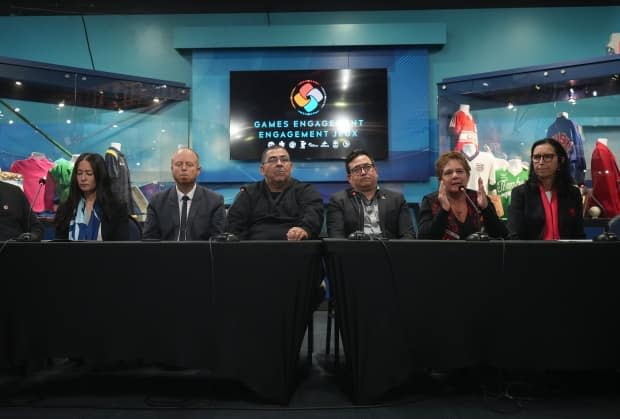COC boss Tricia Smith urges B.C. to return to table in 2030 Olympic, Paralympic bid talks

The table is set, there are options on the menu, but the guests aren't arriving.
Canadian Olympic Committee president Tricia Smith is still imploring B.C. provincial leaders to have a seat with the group working on a bid for the 2030 Olympics and Paralympics, which is led by the Lil̓wat7úl (Líl̓wat), xʷməθkʷəy̓əm (Musqueam), Skwxwú7mesh (Squamish) and səlilwətaɬ (Tsleil-Waututh) nations and also includes the Canadian Paralympic Committee (CPC) and the municipalities of Vancouver and Whistler.
The province announced in late October it wouldn't support the bid, which was asking for $1.2 billion in government funding. But in an open letter to elected B.C. officials Monday, Smith and CPC counterpart Marc-André Fabien said the sides hadn't even come together for an in-person meeting prior to the rejection.
Smith told CBC Sports on Tuesday that there is room for negotiation in the bid proposal sent to the province — if only the province would take a seat next to the bid group.
"And the federal government has advised us, the prime minister has advised, the province has to be on board first. They would come to the table if the province came to the table," Smith said.
Smith, the 65-year-old four-time Olympian, added that provincial and federal government staffs had been attending bid meetings since January, "but made it very clear that they're there as observers."
In a statement to CBC Sports on Tuesday, Lisa Beare, B.C.'s minister of tourism, sport and culture, said the province "worked closely" with the federal government in reviewing the proposal.
"The 2030 Olympic bid proposal includes billions of dollars in direct costs and potential guarantee and indemnity liability risks that could jeopardize the province's ability to provide services for British Columbians," Beare said.
"The province has the responsibility to weigh the benefits with the costs and possible risks of the project, and based on careful consideration, the province declined to support a bid."
The open letter came days after NDP leader David Eby was sworn in as B.C. premier, succeeding John Horgan, who stepped down for health reasons.
Smith said that the timing of the letter was intentional. She said the four host nations asked for a meeting with the province three weeks ago.
"We're really hopeful that we can meet with all levels of government and the stakeholders to really have a full discussion about the bid, the pros and cons, who might take on what," she said from Lausanne, Switzerland, where she's set to attend a week's worth of International Olympic Committee meetings. The 2030 Games are on the agenda.

Open for negotiation
Beare said Monday that news of the rejection was relayed to the bid group in a virtual meeting on Oct. 24, three days before the decision was made public.
"We know that this decision is disappointing for everyone that put so much hard work into the bid, but supporting the proposal any further would require dedicated and substantial provincial resources across government, while there are many competing priorities and challenges to be addressed.
"The cabinet decision is binding."
Regardless, Smith is urging the province to give the proposal a closer look.
"If it doesn't make sense then it doesn't make sense, but we haven't had that opportunity with everybody at the table to really have a hard look at this and see what we can do," she said.
Reconciliation, sustainability at forefront of bid
Smith reinforced the values within the Indigenous-led bid.
"We know that these Games would also address some commitments made by the federal government in terms of the United Nations Declaration on the Rights of Indigenous People. So it's really action on reconciliation," she said.
Another focus of the bid is sustainability. The plan would be to reuse many of the venues from Vancouver 2010, with investment on that front limited to updates as opposed to new builds.
She also emphasized the housing legacy the 2030 plans to leave — a priority in line with the province.
"There's a lot, a lot of flexibility yet," Smith said, "which is why we need everyone at the table."

 Yahoo Sports
Yahoo Sports 